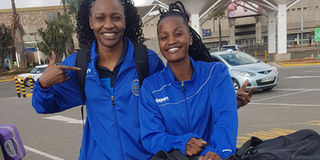Tough task awaits KPA and Equity in Maputo

Taudencia Katumbi (left) and Jamila Zama pose for a photo at Jomo Kenyatta International Airport on November 13, 2018 before leaving for 2018 Africa Club Championships in Mozambique. PHOTO | PHILIP ONYANGO |
What you need to know:
- Teams from Angola, Mozambique, Nigeria have dominated the championships.
IN MAPUTO
Tough task awaits Kenyan teams Kenya Ports Authority and Equity Bank at the Fiba Africa Club Championships for women which tips off in Maputo on Friday.
Since inception, no East African team has come close to winning the championship which has been the preserve of teams from Angola, Mozambique and Nigeria. Apart from winning the championships, teams from these countries have been a permanent feature of the championships in the last four editions.
Reigning Kenyan champions KPA arrived in Mozambique Tuesday at 2.30pm, while Equity Bank - who are the Zone Five champions - are expected in Maputo on Thursday ready for the week-long event whose finals will be played on November 24.
There is a gulf in class between teams from these countries and Kenyan teams, especially KPA women, who have played at the championship for 15 years.
Angolan and Mozambican teams have dominated the women’s competition after adopting professional approach to the game, with development structures in their clubs and national teams.
Apart from having a common coaching syllabus for all teams across the country, the countries have also pumped money into the sport, with each player earning an average of Sh300,000 in monthly salary. They are also offered accommodation, medical care and transport.
Angolan clubs have particularly huge financial muscles due to revenue from oil. Apart from flying in their professional players based abroad (mainly in Spain, Turkey and Portugal), these teams have been able to add to their roasters foreign players in line with the Fiba rules which allow teams to register a maximum of two foreign players for the championships.
REGISTERED TWO FOREIGNERS
At last year’s championships for example, Ferroviario de Maputo registered two foreigners in Gisela Vega from Argentina and Sarah Chan from South Sudan, Inter Club (Angola) registered American Italee Lucas and Nigerian Ndidi Madu, while First Bank of Nigeria had American Dominique Wilson and Senegalese Minata Fofana. Angola’s Primero de Agosto had Leila Donge from Mozambique.
According to Angolan great Victor Muzadi, the country’s teams have the same development structures right from the club level to the national teams.
Muzadi, who is the head of 3-on-3 basketball in Angola, says the teams’ coaches follow the same training structures, making it easy for the players to adapt whenever called upon for international assignments. In Kenya, every coach runs his own system and players have to start learning afresh whenever they assemble for an international meet.
“In Angola, it’s the same style everywhere. Whether teams are learning motion offense, press defence, three point shooting both for the guards and the posts, everybody runs the same system. This has helped our players grow at the same level,” he said in a past interview.
Sprite Storms women’s basketball team coach Abel Nson reckons Kenyan teams are more concerned with success at the local level than internationally.





